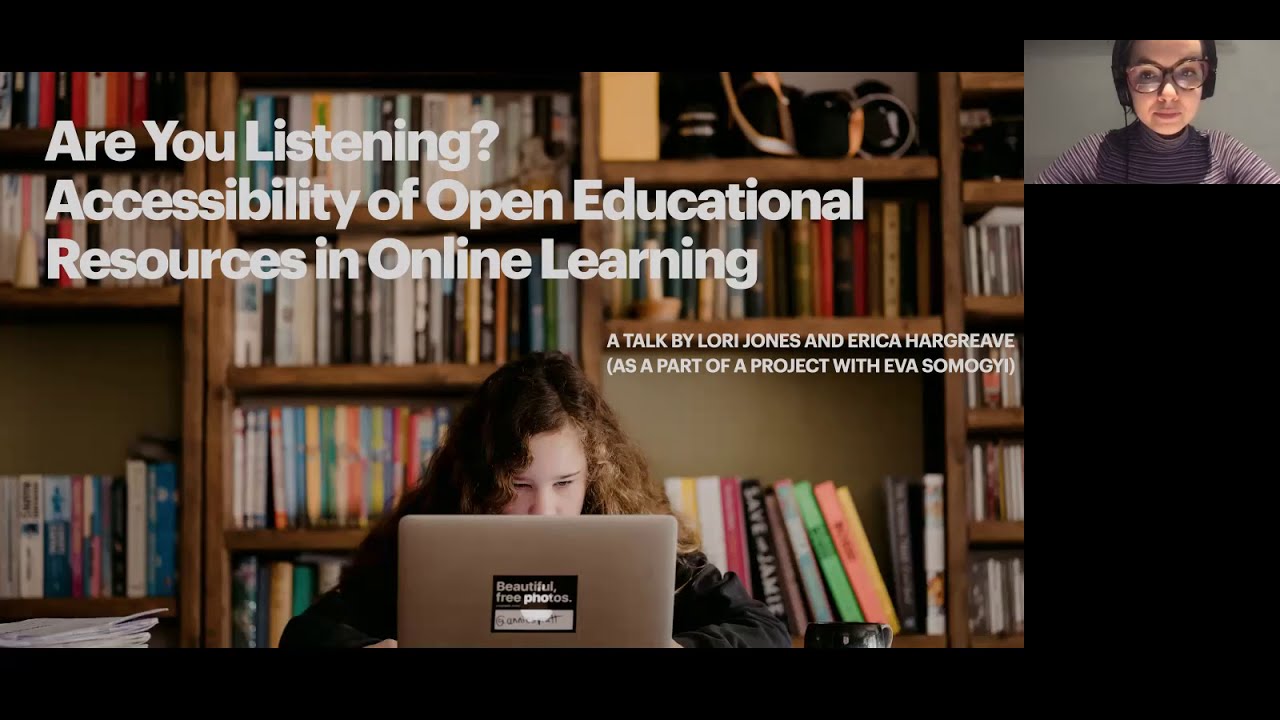Authors: Erica Hargreave, Lori Jones, Eva Somogyi
Institutions: BCIT / UBC / StoryToGo / Ahimsa Media, School District 8 Kootenay Lake / UBC, BCIT / UBC
Country: Canada
Topic: Applications of Open Education Practices/Open Pedagogy/Open Education Research
Sector: Lifelong Learning
UNESCO Area of Focus: Inclusive OER
Session Format: Lightning Talk
Abstract
Who decides what makes content accessible? Are we asking learners with disabilities what makes learning accessible to them, what is problematic, and what solutions work best?
It is our belief that educators need to listen more to learners with disabilities in order to create accessibility that meets their needs, rather than decide what is best for them.
While this is not a new problem when it comes to online learning, it has been highlight by educators’ sudden move to online learning environments during the COVID-19 pandemic. Add to this the minimal resources that creators of open educational resources face, and it is often all too easy to justify not taking the time to make resources accessible to all potential learners or to make broad decisions as to what will make a resource accessible without the input of learners with disabilities.
To address this issue, we are setting out to create a variety of open and free-to-access, educator focused resources that share the voices and experiences of learners with disabilities with online learning. Our goal is to support educators in making their online learning experiences universally accessible by asking and listening to learners with disabilities. The resources that we develop as a part of this project will include a vlogcast series on accessibility matters (sharing the voices, faces, and stories of the disabled community on what accessibility in open, online learning experiences means to them), case studies in the form of blog posts from the accessibility matters vlogcast, and themed open educational courses/units for educators on accessibility in online learning, starting with an open educational course on ableism and how to invite learners with disabilities into the conversation to create truly accessible education.
Keywords
accessibility, ableism, online education, online learning
Hello Everyone,
Lori and I are looking forward to sharing with you some new resources that we are at the early stages of developing, as a way to involved learners with disabilities in making their online learning experiences accessible to them. This is something that we are approaching as educators, instructional designers, and as learners with disabilities.
This is a project that we’d love to involve others in, and make more global in nature, working with people around the world and in different languages. If you think this is something you might like to be involved in, please reach out to us.
Thanks! Looking forward to sharing more on Wednesday.
Erica
Oh and if you have specific questions you’d lLori or I to address in this Lightning Talk, please let us know.
Thanks Jure. Much appreciated.
Here is the slide deck, in case anyone wishes it.
Are You Asking?.pdf (7.4 MB)
Thanks to everyone who joined in @Jonesy’s and my Lighting Talk this morning. It was awesome to see all of your contributions to the questions.
As we didn’t really get to all of the presentation, I thought I’d share the crux of what we are doing here.
As someone who is working through my Masters with some new-to-me disabilities, I’ve learned that I have to be my own advocate and work with teachers to make sure I have what I need to be successful. This is the reality for many people with disabilities as contrary to the believe of some, there is not a magic guide to this is the solution to accessibility for this disability. Studying with a gentleman that has a similar disability to me has taught me that - what works for him, does not for me, and vice versa.
Given this and so many stories like it, as we build the Are You Asking Initiative, our goal is to interview different learners with disabilities on their experiences in online learning - challenges, successes, what works for them, what does not, how they’d like to work with their instructors, their hopes and dreams for the future online learning … etc. We will then be sharing these interviews in a vlogcast / podcast. I conducted the first interview yesterday with crime novelist Jayne Barnard, who actually dropped out of her online Masters due to a lack of accessibility and consideration of her needs. While I need to properly edit the interview, I will do a quick and dirty edit on a few sound bites that I will share here later this week.
In parallel with this, the plan is to build a series of open educational resources for educators on how to start to ask their students what they need, understanding and recognizing systemic ableism, and working with their students to make their courses more accessible.
The plan is to have the interviews as free to use and share but not open (unless the interviewee wishes it to be, and fully understands what that means), as we have a responsibility as documentarians to make sure our interviewee’s words are not taken out of context. And then the accompanying resources and materials for educators will be open.
Let us know if you’d be interested in collaborating on this. We’d love to see this grow globally and in different languages.
